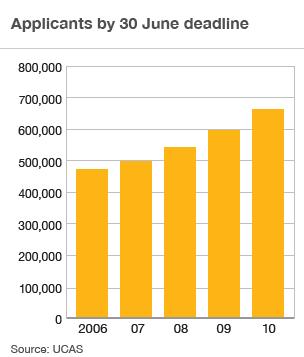Students face clearing shortage
- Published

More people than ever are trying to get into university this year
University places available through clearing look set to be in short supply after A-level results next week.
Record levels of applications and tight financial limits on university places mean more students than ever before will be turned away this year.
A number of universities, including two in Wales and eight in Scotland, already have no places on offer.
University leaders have been calling for the government to be more flexible about places.
David Green, vice chancellor of the University of Worcester - and an expert on admissions - says it is a "national tragedy" that so many well-qualified applicants are set to miss out on places.
"Universities and higher education colleges need to be allowed to recruit more full-time undergraduate students, without penalty," said Professor Green.
Limit on places
Pam Tatlow, chief executive of the Million+ group of new universities, says young people should be reassured that there will be some places available through clearing.

But she said that there was no doubt that this year's clearing process would be "challenging".
She criticised the government for treating the rise in applications and limit on places as a "cash flow problem, rather than a question about long-term investment".
In particular universities are taking issue with the system of fining universities which exceed tight recruitment levels.
Clearing is the process that takes place after A-level and Higher results, when applicants who have not got on to a degree course are matched with with empty places.
Last year almost 48,000 students found places through clearing.
But an increase in applications - up by more than 11% on last year to 660,000 - means that there will be more pressure on places than ever before.
Missing out
The more people who apply, the fewer places that are likely to be available through clearing.
In the past, the most competitive universities have had so many applicants that they rarely offered places through clearing - but this pressure is now moving downward through the university system.
It is expected that after the clearing process has finished up to 200,000 applicants might not receive places this autumn.
Universities are also being financially deterred from any flexibility on numbers - with claims that universities have enough room and staff to take extra students, but are not being allowed because of funding limits.
Universities which over-recruited students last year have faced fines in excess of £3m each.
As such there are expectations that many universities will have fewer places in clearing - with some institutions set to be full hours after the clearing process begins.
'Tough year'
The admissions service, Ucas, says it will not forecast how many places are likely to be available through clearing.
But there are already signs of the pressure on places.
Birmingham, Southampton and Imperial College London are expecting to have few, if any places in clearing.
Bath and East Anglia do not expect to have many places available - and some universities such as Cambridge, Oxford, London School of Economics and University College London do not usually use clearing. Warwick also will have no places available through the system.
Essex says a 30% increase in applications will mean a cut in clearing places, Thames Valley predicts a reduction - and Durham is expected clearing to be "very limited".
In Scotland, eight universities are not taking any students through clearing, five of these - Aberdeen, Glasgow Caledonian, Heriot-Watt, Queen Margaret and Strathclyde - not offering places through clearing for the first time.
Figures to be published next week are expected to show a sharp drop in places available through clearing in Scotland.
"This is definitely a very tough year for anyone who is trying to find a university place through clearing because the rise in applications mean there are very few places left," said a spokesman for Universities Scotland.
In Wales, Aberystwyth University and Trinity College Carmarthen say they will not enter clearing.
The nine other Welsh universities say fewer clearing places will be on offer.